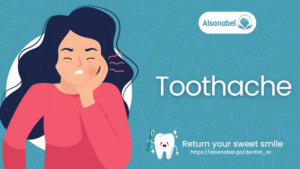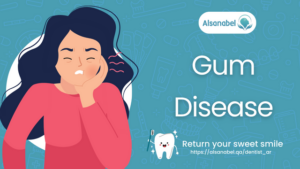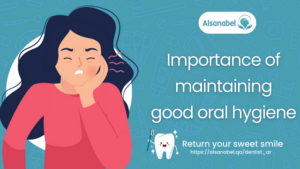In the field of dentistry, it is common for individuals to experience various tooth problems. These problems can vary in severity and may require different forms of treatment. In this blog post, we will provide an overview of some common tooth problems and emphasize the importance of seeking quick solutions.
Common tooth problems
- Tooth decay: It is one of the most common tooth problems that individuals face. It occurs when bacteria in the mouth produce acids that damage the enamel of the tooth, leading to cavities.
- Gum disease: Periodontal disease, is an infection of the tissues surrounding the teeth. It can cause gum recession, tooth loss, and even impact overall health.
- Tooth sensitivity: Characterized by discomfort or pain when consuming hot, cold, sweet, or acidic foods and drinks. It can be caused by various factors, including tooth decay, exposed tooth roots, or worn enamel.
- Dental emergencies: Dental emergencies can occur, such as a knocked-out tooth, severe toothache, or a broken tooth. It is crucial to seek immediate dental care in these situations to prevent further damage and increase the chances of successful treatment or tooth re-implantation.
Overall, it is important to address common tooth problems promptly to prevent further damage and preserve oral health. Regular best dentists in Qatar check-ups and maintaining good oral hygiene practices can help identify and prevent these issues before they worsen. Remember, maintaining a healthy smile starts with taking care of your teeth and seeking professional help when needed.
Toothache
Toothaches are a common dental problem that can cause immense discomfort and pain. They can be caused by a variety of factors, including tooth decay, gum disease, dental abscess, tooth fracture, and even sinus infections.

It is important to identify the underlying cause of the toothache to determine the appropriate treatment. Seeking prompt Dental care specialized center is crucial to prevent further complications.
If you experience a toothache, it is best to schedule an appointment with your dentist as soon as possible. They will examine your teeth and perform necessary tests to diagnose the cause of the pain. Based on the diagnosis, Dental clinic Qatar will recommend the most suitable treatment option. This may include filling a cavity, performing a root canal, extracting a tooth, or treating gum disease.
Home remedies for temporary relief
While waiting for your dental appointment, there are several home remedies that can provide temporary relief from toothache pain:
- Applying a cold compress: Applying a cold pack or ice wrapped in a cloth to the affected area can help numb the pain and reduce swelling.
- Over-the-counter pain relievers: Nonsteroidal anti-inflammatory drugs (NSAIDs) like ibuprofen can provide temporary relief from toothache pain.
- Saltwater rinse: Mixing half a teaspoon of salt in warm water and rinsing your mouth can help alleviate toothache pain and reduce inflammation.
- Clove oil: Applying a small amount of clove oil to the affected area can provide temporary relief from toothache pain due to its natural numbing properties.
- Garlic: Chewing on a fresh garlic clove or applying garlic paste to the affected tooth can help reduce pain and fight bacteria.
These home remedies can offer temporary relief, but it is important to remember that they do not treat the underlying cause of the toothache. Seeking Best dentist Qatar care is crucial to address the root cause of the problem and prevent further complications.
Sensitivity
Tooth sensitivity is a common Tooth Problems that can cause discomfort when consuming hot or cold beverages and foods. It occurs when the protective layer of enamel on the teeth wears down, exposing the sensitive nerves underneath. There are several factors that can contribute to tooth sensitivity, including:
- Tooth decay: Cavities can weaken the tooth enamel and cause sensitivity.
- Gum recession: When the gums recede, the underlying tooth roots become exposed, leading to sensitivity.
- Brushing too hard: Aggressive brushing or using a toothbrush with hard bristles can wear down the enamel.
- Teeth grinding: Clenching or grinding the teeth can cause enamel erosion, leading to sensitivity.
- Dental procedures: Some dental treatments, such as tooth whitening or dental fillings, can temporarily cause sensitivity.
solutions for tooth sensitivity
- Using desensitizing toothpaste: Special toothpaste formulated for sensitive teeth can help block the transmission of sensation to the nerves.
- Applying a fluoride gel or varnish: Your dentist may suggest applying fluoride to the sensitive areas of your teeth to strengthen the enamel.
- Using a soft-bristled toothbrush: Switching to a toothbrush with softer bristles can help prevent further enamel erosion.
- Avoiding acidic foods and drinks: Acidic substances can erode the enamel, so it’s best to limit consumption of acidic foods and beverages.
- Treating underlying dental issues: If tooth sensitivity is caused by an underlying problem, such as gum disease or tooth decay, your dentist will develop a suitable treatment plan to address the issue.
How to prevent tooth sensitivity
Prevention is key when it comes to tooth sensitivity. Here are some steps you can take to prevent or minimize sensitivity:
- Maintain good oral hygiene: Brush your teeth twice a day with a fluoride toothpaste and floss daily to keep your teeth and gums healthy.
- Use a soft-bristled toothbrush: Avoid aggressive brushing and opt for a toothbrush with soft bristles to protect your enamel.
- Limit acidic foods and drinks: Acidic substances can erode the enamel, so it’s important to limit consumption of citrus fruits, carbonated drinks, and other acidic foods.
- Wear a mouthguard: If you grind or clench your teeth, wearing a mouthguard can protect your teeth from enamel erosion.
- Visit your dentist regularly: Regular dental check-ups allow your dentist to detect any early signs of tooth sensitivity or dental issues and provide appropriate treatment.
By following these preventive measures and seeking Dental care specialized center, you can minimize the risk of tooth sensitivity and maintain healthy teeth and gums. Remember, if you experience persistent tooth sensitivity, it is important to consult your dentist for proper evaluation and treatment.
Tooth Decay
Tooth decay, also known as dental caries or cavities, is a common tooth problems that occurs when the protective layer of enamel on the teeth is damaged or weakened by bacteria and acids. This can lead to the formation of small holes or cavities in the teeth.
Causes of tooth decay
There are several factors that can contribute to tooth decay, including:
- Poor oral hygiene: Not brushing and flossing regularly allows plaque to build up on the teeth, leading to the formation of acids that can attack the enamel.
- High sugar and carbohydrate intake: Consuming sugary and starchy foods and drinks provides fuel for the bacteria in the mouth, which then produce acids that contribute to tooth decay.
- Dry mouth: Saliva plays a vital role in neutralizing acids and remineralizing the teeth. A dry mouth can result in an increased risk of tooth decay.
- Acidic foods and drinks: Consuming acidic substances, such as citrus fruits and carbonated drinks, can erode the enamel and make the teeth more susceptible to decay.
Treatment options for tooth decay
If left untreated, tooth decay can cause pain, infection, and even tooth loss. Treatment options for tooth decay depend on the severity of the condition and may include:
- Dental fillings: Small cavities can be treated with dental fillings, which involve removing the decayed part of the tooth and filling it with a tooth-colored material.
- Dental crowns: If the decay has progressed to a more advanced stage and has weakened the tooth structure, a dental crown may be recommended to restore its strength and function.
- Root canal therapy: When the decay reaches the inner pulp of the tooth and causes infection, root canal therapy may be necessary to remove the infected tissue and save the tooth.
- Tooth extraction: In severe cases where the tooth cannot be saved, it may need to be extracted to prevent the spread of infection.
Preventive measures to avoid tooth decay
Prevention is crucial in maintaining good oral health and avoiding tooth decay. Here are some preventive measures that can help:
- Practice good oral hygiene: Brush your teeth at least twice a day with a fluoride toothpaste and floss daily to remove plaque and bacteria.
- Maintain a balanced diet: Limit your intake of sugary and starchy foods and opt for a diet rich in fruits, vegetables, and whole grains.
- Drink water: Drinking water, especially fluoridated water, can help rinse away food particles and neutralize acids in the mouth.
- Chew sugar-free gum: Chewing sugar-free gum after meals stimulates saliva flow and helps wash away food particles and acids.
- Visit your dentist regularly: Regular dental check-ups allow your dentist to detect and treat any early signs of tooth decay before they progress.
By following these preventive measures and seeking professional Dental clinic Qatar, you can maintain a healthy smile and reduce the risk of tooth decay. Remember, early intervention is key in preventing the development of more serious dental problems.
Gum Disease
Gum disease, also known as periodontal disease, is an infection of the gums that can cause damage to the soft tissue and bone supporting the teeth. It is important to recognize the signs and symptoms of gum disease to seek early treatment.

Signs and symptoms of gum disease
- Red, swollen, or tender gums
- Bleeding gums, especially during brushing or flossing
- Receding gums, making the teeth appear longer
- Persistent bad breath
- Loose or shifting teeth
- Changes in the way your teeth fit together
If left untreated, gum disease can lead to more serious complications, such as tooth loss and bone damage.
Tips for preventing and managing gum disease
Preventing gum disease starts with maintaining good oral hygiene and adopting healthy habits. Here are some tips to help prevent and manage gum disease:
- Brush your teeth at least twice a day with a soft-bristle toothbrush and fluoride toothpaste.
- Floss daily to remove plaque and food particles from between your teeth and along the gumline.
- Use an antimicrobial mouthwash to kill bacteria and reduce plaque buildup.
- Eat a balanced diet rich in fruits, vegetables, and whole grains, and limit your intake of sugary and acidic foods.
- Avoid tobacco products, as they can increase the risk of gum disease.
- Schedule regular dental check-ups and cleanings to detect and treat gum disease in its early stages.
- If you have diabetes or other chronic health conditions, manage them effectively to reduce the risk of gum disease.
Taking proactive steps to prevent and manage gum disease can help maintain healthy gums and preserve your oral health. Remember to consult with your Best dentists in Qatar if you experience any signs or symptoms of gum disease.
Bad Breath
Bad breath, also known as halitosis, can be an embarrassing condition that affects many people. It is important to understand the causes and remedies for bad breath in order to address the underlying issues and maintain fresh breath.
Causes and remedies for bad breath
- Poor oral hygiene: Neglecting proper brushing and flossing can lead to a buildup of bacteria in the mouth, resulting in bad breath. Regular brushing and flossing can help remove bacteria and prevent the onset of bad breath.
- Gum disease: As discussed earlier, gum disease can contribute to bad breath. Treating and managing gum disease can help alleviate bad breath caused by this condition.
- Dry mouth: Saliva plays a vital role in keeping the mouth clean and moist. When the mouth becomes dry, bacteria can accumulate, resulting in bad breath. Drinking plenty of water and using oral rinses can help combat dry mouth.
- Dietary factors: Certain foods, such as onions, garlic, and spicy foods, can leave a lingering smell in the mouth. Avoiding these foods or practicing good oral hygiene immediately after consuming them can help minimize bad breath.
- Smoking and tobacco use: Tobacco products not only contribute to gum disease but also leave a distinct smell in the mouth. Quitting smoking and avoiding tobacco can greatly improve breath odor.
Practices for maintaining fresh breath
- Brush your teeth at least twice a day with a fluoride toothpaste and don’t forget to brush your tongue.
- Floss daily to remove food particles and plaque from between the teeth.
- Use an antibacterial mouthwash to kill bacteria and freshen breath.
- Stay hydrated and drink plenty of water throughout the day.
- Avoid excessive alcohol consumption, as it can contribute to dry mouth and bad breath.
By adopting these practices and addressing any underlying causes, you can effectively manage bad breath and maintain fresh breath throughout the day. If bad breath persists despite these efforts, it is recommended to consult with a dentist or Dental clinic Qatar to rule out any underlying medical conditions that may be contributing to the problem.
Discolored Teeth
Tooth discoloration is a common Tooth Problems that many people face. There are various factors that can contribute to the discoloration of teeth.
Common causes of tooth discoloration
- Poor oral hygiene: Not brushing and flossing regularly can lead to the buildup of plaque and stains on the teeth, resulting in discoloration.
- Food and beverages: Certain foods and drinks like coffee, tea, red wine, and dark-colored berries can stain the teeth over time.
- Tobacco use: Smoking or chewing tobacco can cause the teeth to become yellow or brown due to the chemicals present in tobacco products.
- Aging: As we age, the outer layer of our teeth called enamel gets worn down, revealing the yellowish dentin underneath.
- Certain medications: Some medications like antihistamines, antipsychotics, and certain antibiotics can cause tooth discoloration as a side effect.
Methods for whitening and restoring teeth
If you are looking to whiten and restore your teeth, there are several options available. These include:
- Professional teeth whitening: Dentists can provide professional teeth whitening treatments using special bleaching agents that can effectively remove stains and brighten the teeth.
- Over-the-counter whitening products: There are various whitening toothpastes, strips, and gels available in the market that can help remove mild stains and improve the appearance of teeth.
- Dental veneers: Veneers are thin shells made of porcelain or composite resin that are bonded to the front surface of teeth to improve their appearance. Veneers can effectively cover up discoloration and give you a bright smile.
- Dental bonding: Dental bonding involves applying a tooth-colored resin material to the surface of the teeth and shaping it to improve their appearance. This method can be used to cover stains and discoloration.
- Natural remedies: Some natural remedies like baking soda, hydrogen peroxide, and activated charcoal are believed to have whitening properties. However, it is important to use these remedies with caution and consult with a dentist before trying them.
It is important to note that the effectiveness of teeth whitening methods may vary, and it is best to consult with Best dentists in Qatar to determine the most suitable option for your specific case. Additionally, maintaining good oral hygiene practices, such as regular brushing and flossing, can help prevent further discoloration and maintain the whiteness of your teeth.
Chipped or Cracked Tooth
Chipped tooth, it means a piece of the tooth has broken off but the tooth is still intact. A cracked tooth, on the other hand, means that there is a visible crack or fracture in the tooth. Both chipped and cracked teeth can cause pain and sensitivity.
Causes of chipped or cracked tooth
- Accidents or injuries: Trauma to the face or mouth can lead to a chipped or cracked tooth.
- Biting on hard objects: Chewing on hard foods, ice, or non-food objects like pens or hard candy can potentially chip or crack your tooth.
- Tooth decay: If tooth decay weakens the enamel, it can make the tooth more susceptible to chips or cracks.
- Bruxism: Habitual teeth grinding or clenching, also known as bruxism, can put excess pressure on your teeth and lead to chipping or cracking over time.
immediate actions to take for a chipped or cracked tooth
- Rinse your mouth with warm water to clean the area.
- If there is bleeding, apply a piece of gauze to the affected area and apply gentle pressure to stop it.
- If there is swelling, apply a cold compress to the outside of your mouth or cheek.
- Avoid chewing on the side of your mouth with the affected tooth.
- Visit a dentist as soon as possible for evaluation and treatment.
Treatment options for repairing damaged teeth
- Dental bonding An adhesive material is applied to the chipped or cracked tooth and shaped to restore its appearance and function.
- Dental crown A dental crown, or cap, is placed over the damaged tooth to protect it and restore its shape, size, and strength.
- Dental veneers Similar to the treatment for discolored teeth, veneers are thin shells bonded to the front surface of the tooth to improve its appearance and cover up any cracks or chips.
- Root canal treatment If the chip or crack extends to the pulp of the tooth, a root canal may be necessary to remove the damaged tissue and protect the tooth from further decay or infection.
- Tooth extraction In severe cases where the tooth cannot be restored, it may need to be extracted. This is usually followed by a dental implant or bridge to replace the missing tooth.
The choice of treatment will depend on factors such as the extent of the damage, location of the chipped or cracked tooth, and the individual’s overall oral health. It is best to consult with a Dental clinic Qatar to determine the most appropriate treatment plan.
Importance of maintaining good oral hygiene

- Dental check-ups allow dentists to detect any early signs of dental problems such as tooth decay, gum disease, or oral cancer. Early detection is crucial for effective treatment and prevention of further complications.
- Professional dental cleanings help remove plaque and tartar buildup, which cannot be removed by regular brushing alone. This reduces the risk of tooth decay and gum disease.
- Regular dental visits provide an opportunity for Best dentist Qatar to evaluate the effectiveness of your oral hygiene routine and provide guidance on proper brushing and flossing techniques.
- Maintaining good oral hygiene, including brushing at least twice a day and flossing daily, helps remove food particles and plaque, preventing cavities, gum disease, and bad breath.
- Oral health is closely linked to overall health. Poor oral hygiene has been associated with various systemic conditions, including cardiovascular disease, diabetes, and respiratory infections.
Final tips for quick solutions to common tooth problems
- Toothache: Rinse your mouth with warm saltwater and use dental floss to remove any food particles stuck between your teeth. Apply a cold compress to the outside of your mouth to reduce swelling, and take over-the-counter pain medication if needed.
- Tooth sensitivity: Use desensitizing toothpaste and avoid consuming extremely hot or cold foods and beverages. If the sensitivity persists, consult a dentist.
- Bad breath: Maintain good oral hygiene, including regular brushing, flossing, and tongue cleaning. Stay hydrated, and limit consumption of foods and drinks that can cause bad breath.
- Lost filling or crown: Avoid chewing on the affected side and visit a dentist as soon as possible to have it replaced or repaired.
- Dry mouth: Stay hydrated, chew sugar-free gum or suck on sugar-free candies to stimulate saliva production, and avoid tobacco and alcohol.
Remember, while these tips can provide temporary relief, it is essential to consult a dentist for proper diagnosis and treatment of any dental problems.
